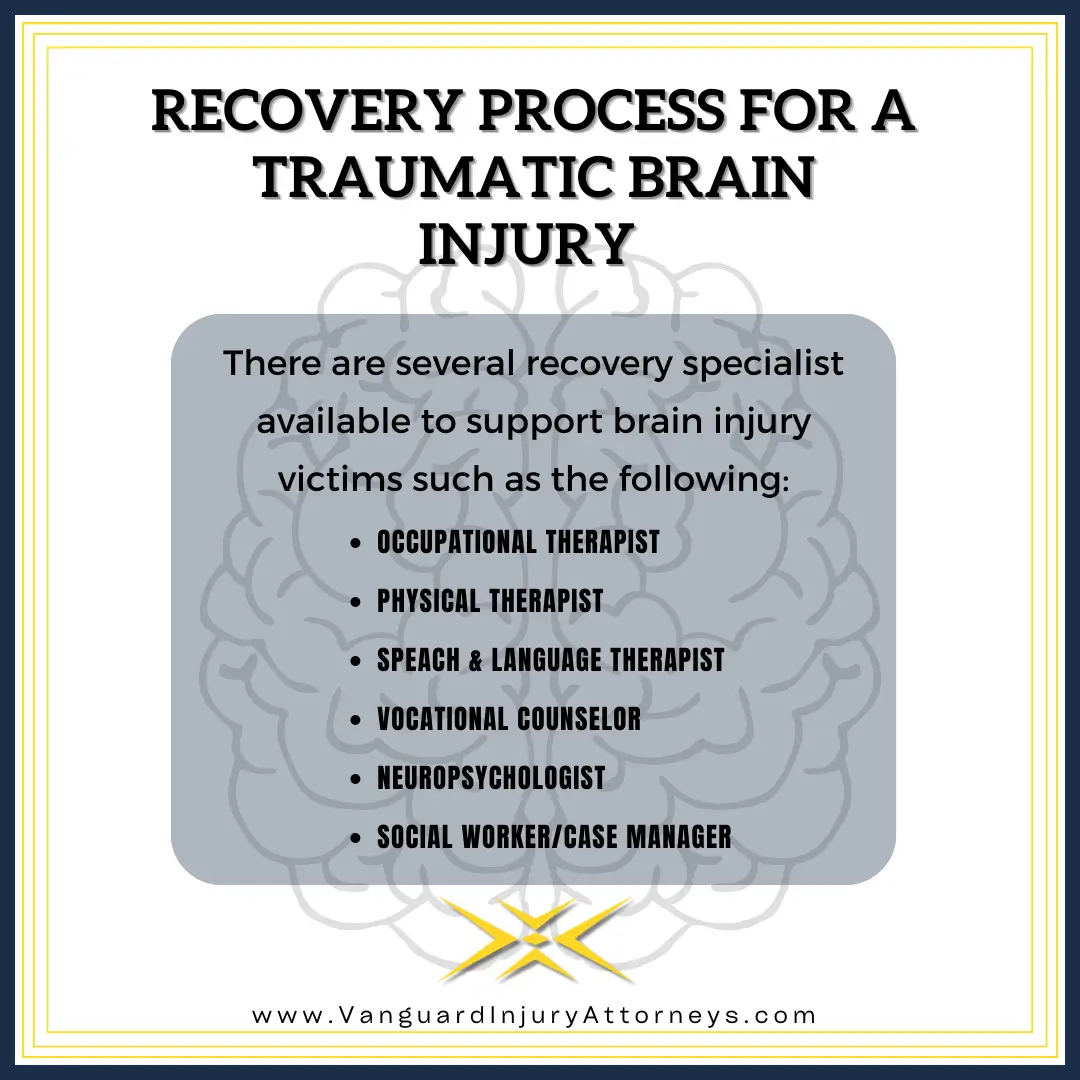Tampa Brain Injury Attorney
Get a Free ConsultationIf you sustain a brain injury in an accident, you may be eligible for financial compensation. The Tampa brain injury lawyers at Vanguard Attorneys can represent your claim and help you secure the settlement that you deserve. Contact us today for a free case review.
The brain is one of the most important organs in the human body. Any damage to the brain can impact memory, concentration, movement, and more, resulting in permanent injuries and financial hardship.

Navigate This Page
- Why Choose Our Tampa Brain Injury Lawyers
- Should You Hire a Tampa Brain Injury Lawyer?
- Our Tampa Case Results
- What is a Traumatic Brain Injury Lawsuit?
- What is My Brain Injury Case Worth?
- How Long Do I Have to File a Brain Injury Claim in Florida?
- How to Prove a Tampa Brain Injury Lawsuit
- What are the Long-Term Effects of a Traumatic Brain Injury?
- The Recovery Process for TBI
- Types of Traumatic Brain Injuries
- Traumatic Brain Injury Statistics
- Contact Our Tampa Brain Injury Attorneys Today
Why Choose Our Tampa Brain Injury Lawyers
- Our Tampa brain injury attorneys have decades of combined legal experience. We are dedicated to achieving maximum compensation in your claim.
- We understand the financial hardship that often accompanies a brain injury. Our Tampa personal injury law firm takes all cases on a contingency fee basis—if we do not secure an award in your case, you will not be charged legal fees.
- We are a smaller boutique firm with strong ties to our local community. Our legal team will leverage our resources and connections to craft a compelling case in your favor.
Should You Hire a Tampa Brain Injury Lawyer?
Sustaining a brain injury can be a painful, traumatic event to endure. In these situations, you can feel overwhelmed, confused, and disoriented. You may worry about your future, your ability to work, and your financial situation. The physical and psychological impact of the injury can be difficult to endure.
You need an advocate on your side who can fight for your right to maximum recovery and secure the justice you deserve. By hiring a Tampa brain injury attorney to represent your claim, you can gain access to valuable resources and support, as well as the following benefits.
- Your TBI lawyer will handle all negotiations and important communications on your behalf, including discussions with insurance companies.
- Your attorney will help you prepare for each stage of the litigation process and handle all administrative tasks on your behalf.
- Your lawyer can enlist the support of expert witnesses who can inform complex parts of your case, such as your long-term damages or the nature of your injury.
- Your Tampa brain injury attorney can conduct an in-depth investigation into your accident and subpoena relevant evidence from third parties who may be reluctant to share.
- Your lawyer will know how to identify all possible avenues to compensation following your accident and accurately calculate your final award.
Above all, a Tampa brain injury attorney will fight for your maximum compensation and look out for your best interests. Traumatic brain injury cases can be difficult to win, but with a lawyer on your side, you can present the strongest possible case to the courtroom and advocate aggressively for your full recovery.
Our Tampa Case Results
- $3.8M in a motorcycle accident collision case
- $100K in a premises liability case that result in serious injuries to the client’s neck and back
- $1M in a slip and fall case against one of the largest department stores in the United States
What is a Traumatic Brain Injury Lawsuit?
Many TBIs occur due to the actions of another party. If you sustain a brain injury during an unexpected accident or assault, you can pursue legal action and recover compensation for the physical, emotional, and financial losses that you sustained.
Most Florida TBI victims can secure a settlement by filing a personal injury lawsuit in Tampa or an insurance claim against the at-fault party, which may include motorists, property owners, or truck drivers. Your optimal path to compensation will depend on the cause of your accident.
For example, say that you are injured in a car accident. Because Florida is a no-fault state, you could first file a claim under your own insurance policy. You could also file a third-party claim against the at-fault driver’s insurance company, as TBIs generally qualify as a serious injury under Florida law. If your insurance claim is unsuccessful, you could escalate your claim to a lawsuit and hold the driver accountable in Florida civil court.
If you are unsure what to do following a TBI, your brain injury lawyer from Vanguard Attorneys can help. He or she can evaluate your case and identify your optimal path to maximum recovery.
What is My Brain Injury Case Worth?
Brain injuries can be very severe and often result in permanent limitations. As a result, victims of TBI often suffer from financial hardship as well as emotional and physical trauma. By filing a brain injury claim, however, you can recover the financial compensation necessary to pay for these losses.
Examples of damages in TBI claims include the following.
- Medical expenses
- Lost wages or lost income
- Property damage
- Loss of future earnings
- Loss of earning capacity
- Disability accommodations
- Rehabilitation and physical therapy
- Pain and suffering
- Emotional distress
TBI settlements can be very high due to the severity of these injuries and the need for long-term medical care. These cases often result in hundreds of thousands of dollars in compensation. Your attorney can evaluate your brain injury claim and estimate your potential award, helping you avoid an insufficient settlement.
How Long Do I Have to File a Brain Injury Claim in Florida?
If you believe that you qualify for a brain injury lawsuit, it is important to act quickly and seek help as soon as possible. Under Florida law, these claims are subject to a filing deadline according to the state’s statute of limitations.
You must file a brain injury lawsuit in Florida civil court within four years of your accident. If you file after this deadline passes, the court will likely dismiss your brain injury case—preventing you from recovering the compensation that you deserve.
There are several exceptions to the statute of limitations, but they do not apply to every situation. To protect your rights and your future recovery, it is important to speak with a Tampa traumatic brain injury attorney as soon as you can following your injury. A brain injury lawyer in Tampa can identify your appropriate filing deadline and take the first steps toward securing the settlement that you need to recover.
How to Prove a Tampa Brain Injury Lawsuit
Proving a brain injury lawsuit typically requires you to establish the at-fault party’s negligence. There are four important facts that you and your Tampa brain injury attorney will need to prove in order to show the defendant’s liability: duty, breach of duty, causation, and damages.
Duty
The at-fault party owed you a duty of care at the time of the accident that resulted in your brain injury. This duty will vary depending on the cause of your TBI. For example, property owners have a duty to maintain safe premises, and drivers must follow Florida traffic laws.
Breach of Duty
The at-fault party breached his or her duty of care in some way. Property owners who ignore repair requests or allow their premises to become dilapidated breach their duties. Drivers who speed or run red lights also breach their duties.
Causation
The at-fault party’s breach of duty caused your brain injury. You will need to show that you would not have experienced the injury if not for the defendant’s actions. Evidence like witness testimony, police reports, and medical records can help prove this element.
Damages
You sustained damages related to your brain injury that you can collect in your lawsuit. Evidence like pay stubs, correspondence, medical bills, and testimony from expert witnesses, like care planners, can help establish your right to compensation.
What are the Long-Term Effects of a Traumatic Brain Injury?
 Traumatic brain injuries (TBI) not only have immense effects on those who have been injured, but these injuries also have a significant impact on family members and caregivers as well. A blow to the head or significant whiplash can result in a TBI with a wide spectrum of severity. The mildest TBI might cause headaches and intermittent irritability. A moderate TBI can result in decreased cognitive function, increased emotionality, and decreased impulse control. The most severe TBI can leave a patient in a coma or on a ventilator, unresponsive to most stimuli, and without the ability to function independently.
Traumatic brain injuries (TBI) not only have immense effects on those who have been injured, but these injuries also have a significant impact on family members and caregivers as well. A blow to the head or significant whiplash can result in a TBI with a wide spectrum of severity. The mildest TBI might cause headaches and intermittent irritability. A moderate TBI can result in decreased cognitive function, increased emotionality, and decreased impulse control. The most severe TBI can leave a patient in a coma or on a ventilator, unresponsive to most stimuli, and without the ability to function independently.
A TBI can be caused by a variety of factors including:
- Car accidents
- Motorcycle accidents
- Boat accidents
- Sports-related injuries
- Slip and falls
- Violent crimes
Warning Signs of a Brain Injury
Not all brain injury symptoms are obvious immediately after the accident. In some cases, victims of TBI do not experience symptoms for hours or even days following the initial injury.
If you experience any of the following symptoms after a head injury, seek emergency medical attention as soon as you can.
- Loss of consciousness
- Dizziness
- Slurred speech
- Persistent or worsening headache
- Difficulty with concentration or memory
- Nausea or vomiting
- Unexplained changes in sleep patterns
- Difficulty with vision or hearing
- Changes in mood or emotions
- Clear fluids draining from the nose or ears
You should always seek medical attention after you sustain a head injury, even if you feel uninjured. Without prompt medical care, TBIs can be fatal or result in permanent impairments. To avoid potential complications, visit a hospital as soon as possible.
Not only will seeking medical care help you receive the care you need, but you will also be able to gather the necessary evidence that you can use to support your future claim. Always make sure to save all records related to your injury and treatment.
The Recovery Process for TBI
Whatever the cause of the injury may be, professional treatment is crucial for a TBI survivor. Different forms of therapy, medication, and other medical treatment are helpful in the patient’s recovery. Family members of the injured individual may also need time with a therapist to learn coping methods and how to adapt appropriately.
Most victims of TBI require rehabilitation to improve their ability to perform daily tasks. This treatment typically begins in the hospital following initial medical care before moving to an inpatient unit or outpatient or residential treatment facility. Different patients will require different rehabilitation needs, depending on the type and severity of the injury.
There are several rehabilitation specialists available to support brain injury victims, such as the following.
- Occupational therapists, who support patients in learning and improving skills to engage in daily activities
- Speech and language therapists, who guide patients through improving communication skills and learning how to use special assistive devices
- Physical therapists, who help patients improve mobility and practice balance, walking, and movement
- Vocational counselors, who help patients understand their ability to work and provide resources to overcome common workplace challenges
- Neuropsychologists, who help patients assess their cognitive performance and learn necessary skills to manage their emotional and psychological health
- Social workers and case managers, who connect patients with service agencies and communicates with providers and family members to plan future care
Types of Traumatic Brain Injuries
Although brain damage can range in severity from relatively mild to extremely severe, any type of head injury, open head injury or closed head injury, is dangerous. There are several types of traumatic brain injuries that you can sustain, including concussions, hemorrhages, and diffuse axonal injury.
Concussions
Concussions are some of the most common types of brain injuries that people sustain. This injury occurs when the brain hits the walls of the skull due to force, shaking, or impact. As a result, the brain changes function and the victim can suffer from painful symptoms like concentration, memory loss, and headaches.
Penetrating Brain Injuries
An object may penetrate the skull and damage the brain inside, causing serious injury and long-term damage. Penetrating injuries can impact a small or large part of the brain, depending on the region of impact. This injury requires immediate medical attention and is often life-threatening.
Hemorrhages
Hemorrhage is another term for uncontrollable bleeding. This injury often occurs in the brain when blood vessels rupture. This can happen due to natural causes like aneurysms, or traumatic accidents that cause the brain to hit the sides of the skull.
After an accident, hemorrhage can occur within the brain tissue as well as the spaces around the brain. Without prompt medical attention, severe swelling, pressure, permanent disability, and death may occur.
Diffuse Axonal Injury
The brain contains important connecting nerve fibers called axons, which help different groups of brain cells communicate with each other. During an accident, these nerves can become torn or sheared due to rapid acceleration or deceleration. As a result, the victim develops a diffuse axonal injury.
Many victims of diffuse axonal injury experience permanent injury and often slip into a coma. Recovery is possible if the injury is mild, but survivors with severe diffuse axonal injury often remain unconscious. Those who are able to regain consciousness develop severe impairments and require intensive, long-term medical care.
Anoxic Brain Injury
The brain requires a steady supply of oxygen to survive. If a person is deprived of oxygen for a long period of time, brain cells will begin to die and severe and permanent brain damage can occur. Prolonged oxygen deprivation is fatal.
Anoxic brain injuries occur due to oxygen deprivation. This can occur due to carbon monoxide poisoning, drowning, suffocation, and any other acts that prevent oxygen from reaching the brain. Negligence of behalf of employers, landlords, property owners, and many other parties may lead to anoxic brain injury.
Traumatic Brain Injury Statistics
Traumatic brain injuries (TBIs) are more common than we may believe. According to the Centers for Disease Control and Prevention (CDC), approximately 69,000 people died from TBIs in the United States during 2021 alone.
Falls are responsible for over 50% of TBI-related hospitalizations. Many other victims sustain a TBI during motor vehicle crashes and violent assaults. For TBI-related deaths, firearm-related suicides are the most common cause.
Contact Our Tampa Brain Injury Attorneys Today
A severe TBI may render the survivor totally dependent. Many families just cannot handle the around-the-clock financial, physical and emotional demands of caring for the survivor at home. If you, or a loved one, have experienced a TBI, please contact a Tampa brain injury lawyer at Vanguard Attorneys so we can begin working on your personal injury claim and guide you through this challenging time.
Our Tampa traumatic brain injury attorneys work with experts who are prepared to explain the emotional, physical, and financial impact of a TBI. Most importantly our Tampa brain injury lawyers will work with you and your loved one with patience and care.
For more information about how we can assist you, contact us today. Our personal injury law firm is located in the Ybor City Historic District off of Nuccio Parkway and East 5th Ave. We proudly serve all of Florida, including Tampa, Brandon, Riverview and Town ‘n’ Country.
“If you want a law firm that will fight for you then choose Vanguard. The professionalism is right on point, responsiveness is timely and you get the results you want and deserve.”
– Thelsuice Gonzalez
